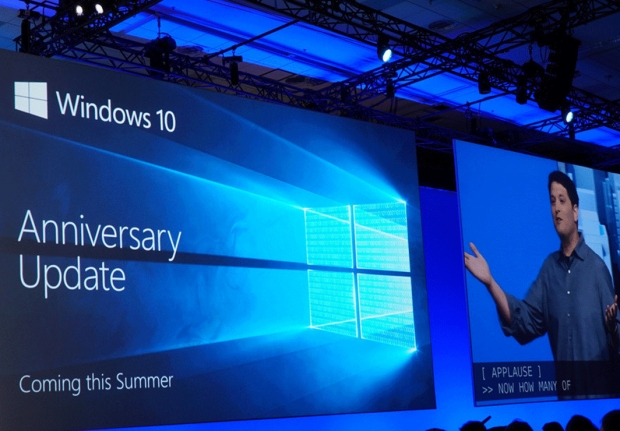A press release was posted and then pulled, from Redmond’s site but was seen by her Majesty’s loyal tech press and posted.
The August 2 date would be four days after Windows 10's free upgrade deadline ends on July 29.
The Anniversary Update will bring some key improvements to Windows 10, which debuted almost a year ago on July 29, 2015. Windows 10 Insiders have received tastes of what's to come in preview builds released over the past months, and we already know what some of its best features will be.
For Linux developers there will be something called the Bash Shell which will bring Linux’s Bash shell to Windows 10. This will be an app available in the Windows Store, and it will provide a full Ubuntu image that runs in userspace as a program on your desktop. Programs compiled for Linux will just run without even needing to be recompiled for Windows. You can use Ubuntu’s apt-get command to download and install programs.
There will be a virtual desktop feature that lets you pin an open app to all of your virtual desktops. Pinned virtual desktop apps are already in the Windows 10 preview builds. To activate it all you need to do is open the Task View used to manage virtual desktops, right-click on the window you want to pin, then select Show this window on all desktops.
On the theme front there will be a new Dark Theme for those who prefer to keep things gloomy. There is also much needed improvements to the Edge browser which might actually make it useable. It is finally getting extension support, once extensions are formally rolled out, you’ll be able to install them directly from the Windows Store.
Edge will also get intelligently auto-pausing of “content not central to the webpage” making annoying Flash ads something you may never have to waste battery downloading.
Less exciting is yet another biometric identification system which will make signing in from your own home that much annoyingly longer. Windows Hello is supposed to help you sign into apps and web services by showing your face at the screen or by putting your digits on a scanner. Fortunately this will be optional but would be useful for things like hot-desking.
Cortina will also get smarter. The digital assistant is probably quiet good but its dependence on Bing makes it a chocolate teapot in many ways. According to Microsoft Cortana’s becoming more proactive and powerful, as Microsoft grants her greater access into the Office, Outlook, and Calendar apps.
This means that you can use commands like “Send Paola that word document that I worked on last night” and Cortana will actually understand what you mean. Developers will also be able to bake Cortana into third-party apps.
We have not played with Cortana much because it does tend to automatically open a Bing webpage every time it is confused. This is a bit like saying “I have no idea, so I will take you to a search page which has no idea either.”
Apparently Cortana will be able to talk to your phone. Pull notifications and low-battery warnings from your phone and beam them to your PC, cutting back on the need to pull your phone out of your pocket. The communication will go both ways, too, as you’ll be able to pull up Maps directions on your PC and push them over to your phone. It works with Android but Apple fanboys will have to get a proper phone to see it in action. Given that they are probably not using a proper computer either this whole article will be meaningless to them.
Other than that it is mostly tweaks to and apps to make things a little easier on the OS.




